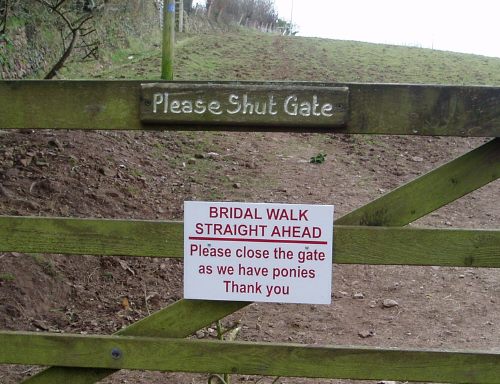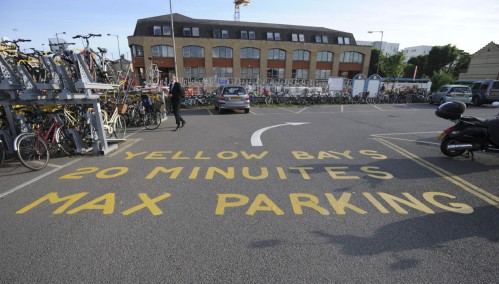|
English Language
|
Spelling
More issues and solutions
There is certainly an element of social inequality and of embarrassment, between those who can spell and those who can't. Do you notice the spelling error below? Did you think that this might be a track leading to a church? Do you smile at the error ? Is this because it's intrinsically funny - or because you feel superior to the writer? Why do we laugh at homophones such as bridal / bridle?

Although spelling errors are certainly more likely to be a social problem rather than one of communication (and one which is to some extent being overcome by spelling and grammar checkers) there remains in some people's minds a link between bad spelling and lack of intelligence. For many, perhaps most, people good spelling remains a mark of excellence. But should it be? Is spelling really a handicap to understanding? What can we do to solve the problem? Is a phonetic system the answer?

The mis-spelling of minutes was mocked by newspapers partly because it was in a car park in Cambridge "renowned for being a seat of learning" [The Times] . This seems to reinforce the link between academic learning and spelling ability - even though it was National Car Park road workers (who may not have attended the university) who painted the sign. The story gained traction because the original error was left for two years then repainted with exactly the same error.
Another example, this time from the USA. Dan Quayle, one-time vice-president of the United States, "corrected" a 12 year old boy's spelling of "potato", telling him it ended in an "e". A New Jersey teacher commented:
"If he doesn't know how to spell potato he should not be vice-president."
What's going on in this Twitter exchange between an online "troll" and the author Salman Rushdie, infamous for the book Midnight's Children, widely viewed as being anti-muslim.
Troll: YOU ARE LAYER. SHAM YOU.
Rushdie: YOU ARE ILLATIRITE. LARN SPEL. THEN GET BRANE.
The origins
of the alphabet
There are problems inherent in having a limited symbol system (42-48 sounds
and only 26 symbols).
There is also no agreement on a single pronunciation which could be the
standard for a phonetic system. If RP is chosen, would this alienate or
disenfranchise the majority of the population who do not speak with an
accent which even approximates to RP? If another accent were chosen, what
would it be - and how would speakers of other accents react? Would this
hasten the separation of varieties of world English?
The origins of our spelling lie in an originally near-phonetic system which has been fossilised in its written form while change has continued in the spoken form. In addition, several different sets of guidelines have been used at different times to represent sounds on the page - the original Anglo-Saxon conventions differing significantly from the invading Normans and all the later loan words from elsewhere around the world.
Homonyms
and homophones
"Witch" and "which", "read" and "reed",
are homophones because they sound the same though they are spelled differently.
"Fly" is a word with many different meanings (look it up in
the OED and you may be surprised how many meanings there are) but the
small insect (noun) and the verb describing travelling through the air
are obviously different meanings for an identical spelling, so the word
is a homonym.
By adopting a phonetic approach we would make homophones into homonyms - apart from context there would be no differentiation between such words either when spoken or written and the number of homonyms would be much greater than today.
Fossilisation
in spelling is caused by printing, education and dictionaries, all of
which have the effect of supporting the status quo and restricting change.
Change in pronunciation is a natural feature of linguistic change and
is affected by exposure to accents which differ from your own – an
experience which is growing with increased travel and global communications.
However change is restricted in writing and the two coding systems continue
to grow apart.
Change is desired but
Against change:
- There is no agreement on an optimum system
- The phonetic system is flawed because of the existing alphabet
- There is an inbuilt conservatism and a desire to remain with the system we know and control
- Regional differences in pronunciation would create either a non-standard writing system or a standard writing system which does not relate to local conditions
- Reprinting of existing texts would be costly and time consuming
- An old and a new system would be unmanageable
- An old and a new system would create an under-privileged class who had no access to old texts
For change:
- Saving in paper and space by writing fewer letters (existing structures such as –ough become superfluous)
- Easier learning for young children, people with learning difficulties, foreign language learners
- Rewriting of existing texts could be easily achieved electronically
The Solution
A likely solution would be non-radical so as not to affront existing users or make existing texts redundant, gradual so as to be flexible and to grow with young users, use the existing alphabet so that existing keyboards would not be redundant, and based on phonetic simplification. I suggest that the American model is already taking over by stealth by way of imported culture, advertising, goods and global communications dominated by the USA.
Already, in addition to vocabulary items and idioms we have the distinctive
spellings "program", "encyclopedia" and frequently
in advertising "color' and "donut". Quick is often "kwik"
and clean is often "kleen", "favourite" appears on
the world's most used web browser as "favorite" and is becoming
increasingly used in this context. Surely "calender", and "flavor"
cannot be far behind.
Reducing the number of known irregularities :( -or words like "doctor"
and "actor" and –our words like flavour and colour to become
–er words like teacher and baker, -re and -er words standardised
etc) would simplify without confusion or loss of meaning.
While some silent letters such as the "p" in "pneumonia"
and the "k" in "know" are helpful in linking those
words with their etymologies (pneumatic, knowledge etc) others such as
the "b" in lamb would surely not be missed – to the delight
of generations of learners.
Further Reading
Meihem In Ce Klasrum. by Dolton Edwards (1946) also known as Kaos in ce klasrum, Euro-English etc
Historical legacy. A thorough, analytical, yet very readable book by David Crystal, is Spell It Out - The Singular Story of English Spelling.
Another page on spelling problems and issues
A n article about the Simplified Spelling Society
|
|